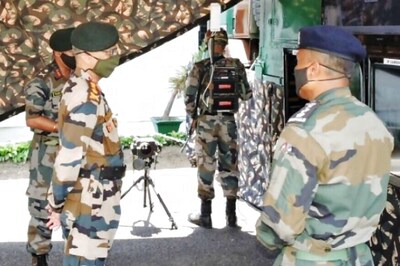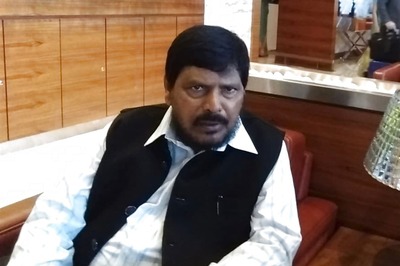
views
Washington: Pakistan's Foreign Minister has said that his country has asked the United States to provide unmanned aircraft that would allow Pakistan to strike extremists hiding in rugged terrain along the Afghan border.
Shah Mahmood Qureshi said in an interview with Associated Press reporters and editors that Pakistan, and not the United States, should control the missile strikes that have killed high-level extremists but also civilians.
He is also defending, in meetings with top Obama administration officials, his government's decision to offer a peace deal to militants, and is trying to reassure Americans worried about the release from house arrest of Abdul Qadeer Khan, a scientist whose smuggling operation shipped nuclear technology to North Korea and Iran.
The U.S. missile strikes are one of the most sensitive issues in U.S.-Pakistan ties, and Qureshi said they are making it harder for his government to persuade infuriated Pakistanis along the frontier to support the fight against militants.
"We feel that if the technology is transferred to Pakistan, Pakistan will be in a better position to determine how to use the technology and, without alienating people, achieve the objective," he said on Wednesday.
"Pakistan is a willing partner with the U.S. in this fight," he said. "Let us exercise that judgment."
The United States relies on nuclear-armed Pakistan to fight resurgent extremists operating along the Afghan-Pakistan border, and is eager to strengthen a Washington-backed government facing high inflation, a sinking currency, widespread poverty and a violent insurgency by Islamic militants.
But the United States has continued to fire missiles into Pakistan from drones believed launched from neighboring Afghanistan.
Qureshi said the matter of Pakistan getting drones was raised Tuesday in a meeting with President Barack Obama's national security adviser, retired Gen. James Jones. He would not provide specific details; "we are talking at this stage," he said.
White House spokesman Robert Gibbs would not comment on Qureshi's comments Wednesday.
Qureshi also described the Obama White House as more "willing to listen" to Pakistan and "more understanding" than the Bush administration.
The Bush administration initially was a strong supporter of the current Pakistani government's predecessor, former President Pervez Musharraf, calling the former general "indispensable."
The Bush government, Qureshi said, "had a point of view, and it was like the approach was, 'This is it; take it or leave it.'"
Qureshi and Pakistan's army chief are in Washington to participate, along with Afghan Foreign Minister Dadfar Rangeen Spanta, in the Obama administration's efforts to draw up a new strategy for Pakistan and Afghanistan. Qureshi and Spanta were scheduled to have dinner Wednesday with Secretary of State Hillary Rodham Clinton. Qureshi has also met with Democratic Sen. John Kerry, chairman of the Senate Foreign Relations Committee.
Qureshi described his message to U.S. officials as follows: "Do not doubt our commitment — this government has demonstrated its political will — but make us more effective, and, if you want to see better performance, then enhance our capacity."
Pakistan, he said, needs more helicopters and night-vision technology to better fight militants.
Pentagon spokesman Geoff Morrell said the U.S. review of Pakistan and Afghanistan "won't just be window dressing: take a look at our plan and sign off on it when it's already virtually completed."
"We are all collectively in this, and we need as much advice and buy-in as possible for this to be a" success, Morrell told reporters.
Qureshi said he wanted Americans to know that Pakistan's nuclear assets are "safe and secure" and that, "as far as Pakistan is concerned, Dr. A.Q. Khan is history. His network has been broken."
He said Pakistan would not allow U.S. officials access to Khan, but said that Khan poses no danger as a nuclear proliferator and will not be allowed to travel abroad.
He also addressed criticism by the West of Pakistan's efforts to strike a peace deal with militants in the Swat valley. On Tuesday, militants in Swat announced an indefinite cease-fire in support of the initiative, which allows for the imposition of a version of Islamic law there.
Qureshi said the issue has been "gravely misunderstood" and that he has explained to concerned U.S. officials that militants must lay down their weapons before any agreement is signed. "There is no question of surrender; there is no question of capitulation."




















Comments
0 comment